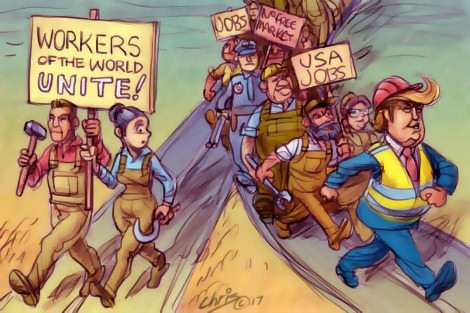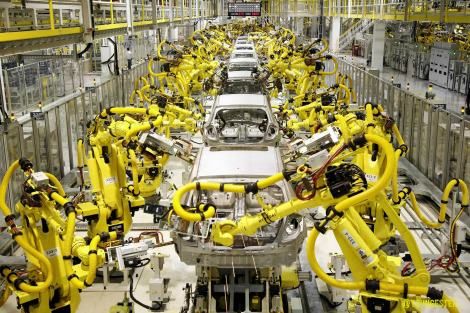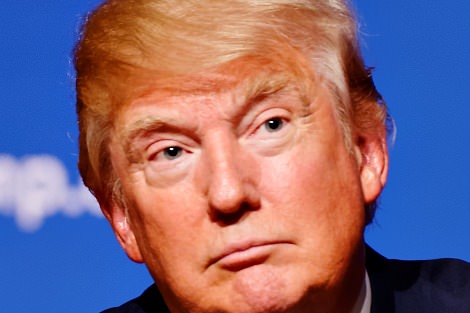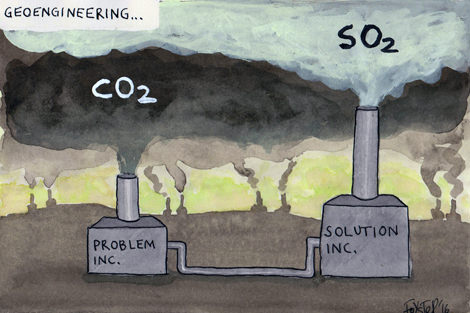Keywords: Capitalism
There are more than 200 results, only the first 200 are displayed here.
-

AUSTRALIA
- Daniel Nicholson
- 24 February 2017
9 Comments
In the footage of one violence protest, I was shocked to see a handful of my homeless clients, draped in Australian flags, engaged in street battles with anti-racists. These young men had experienced alienation, exploitation and poverty - all the things the Left is supposed to fight against. Long, uncomfortable conversations don't make for good social media content, yet if Australia is to stare down the threat of a rising alt-right it won't be done by yelling at right wing fringe groups across a police barricade.
READ MORE 
-

AUSTRALIA
- Michael Walker
- 20 February 2017
20 Comments
The presidency of Donald Trump should bring a renewed focus on the dangers of unbridled capitalism. The Catholic Church has a rich trove of teachings on the subject that have been missing in action for the past 30 years. Now is the time for a well-articulated Christian message addressing such issues as widening wealth inequality fuelled by stagnant wage growth, the privatisation of public services, the financialisation of the economy (which fuels both of those trends), and tax justice.
READ MORE 
-

INTERNATIONAL
- Colin Long
- 10 February 2017
15 Comments
Much commentary on Trump's victory has veered between two explanations: either there is large proportion of the electorate with 'deplorable' attitudes to women and minorities; or economic dislocation has produced an angry white working class eager to punish political elites. These explanations are not mutually exclusive. The willingness to ignore or welcome Trump's misogyny is a symptom of the undermining of a deep sense of masculinity that, for some men, is their primary identity.
READ MORE 
-

ENVIRONMENT
- Greg Foyster
- 02 February 2017
10 Comments
If climate change were a short-term problem, polarisation wouldn't be so crippling. One side could push a solution through parliament, and by the time the other side took power it might be a non-issue. But climate change is an extraordinarily long-term problem that requires massive investment in new infrastructure and consistent policy settings over decades. It needs a supermajority of support so years of work isn't undone with each change of government. That means getting conservatives on board.
READ MORE 
-

AUSTRALIA
- Sonia Nair
- 28 November 2016
11 Comments
Belonging to a generation where I was constantly told I could do anything I set my mind to, I was carted off to every class imaginable as a young child - art class, violin class, music theory class, English literature tutoring and so forth. But the advent of unparalleled choices that was constantly peddled to me did not coincide with an increase in the spaces that are available for young people to excel, or much less be employed, in the fields of their choice.
READ MORE
-

ENVIRONMENT
- Frank Brennan
- 28 November 2016
'No matter what the economic, political and legal problems confronted by modern day India, our response can be improved by an application of the key principles and norms developed in the international law of trade and human rights, helping to enunciate the realm of law, regulation and political accountability, enhancing public scrutiny providing the right environment for doing business.' Frank Brennan presents the 25th JRD Tata Oration, Xavier School of Management, Jamshedpur, India, 26 November 2016.
READ MORE
-

ECONOMICS
- David James
- 21 November 2016
9 Comments
The idea that machines will replace humans, transforming the work force, is far from new. As technology develops at an accelerating pace, there is growing concern that new social divisions are emerging. While there are signs of deepening social divisions between the rich and the rest of the working population, previous predictions of a collapse in employment have proven to be wrong. This is largely because a confusion arises from conflating production and transactions. They are not the same thing.
READ MORE
-

AUSTRALIA
- Evan Smith
- 27 October 2016
19 Comments
While the White Australia Policy attempted to prevent non-white workers from living and working in Australia, people from across the globe continued to do both, although often at the margins of white Australian society. The Australian Labor Party and the trade unions were complicit in maintaining this racial divide. In Australia today, a new wave of migrants is working in convenience stores, driving taxis or cleaning buildings. They are part of the Australian working class, but are often not considered such.
READ MORE
-

RELIGION
- Ann Deslandes
- 02 September 2016
19 Comments
Many Brazilians remember the 'Red Bishop' as much more than a defender of human rights. For these people, Helder Camara is included reverently in the litany of rogues who drew the ire of church and state authorities by demanding both do a better job of embodying a message of social justice. It was a powerful idea to grow up with: that this imposing and defining institution I had been born and baptised into contained a rebellious truth that often demanded we go against the institution's own grain.
READ MORE 
-

ENVIRONMENT
- Greg Foyster
- 03 August 2016
6 Comments
The neoliberal right is losing political power to the populist right, which isn't filled with the same ideological zeal for free-market capitalism. Suddenly debates can expand beyond the narrow confines of economic growth. Moral and social arguments won't be relegated to the intellectual fringes anymore. Mainstream parties of the left and right, both of which bought into the neoliberal agenda, will have to break their bipartisan dismissal of discontent with the side effects of globalisation.
READ MORE 
-

INTERNATIONAL
As the US goes through its convention season, it is becoming increasingly clear that the choice is between someone spouting decidedly undemocratic and possibly fascist rhetoric and someone for whom democratic decision-making is, at best, something to be evaded with as little scrutiny as possible. Both parties are moneyed and both seek foreign scapegoats upon which to direct media attention. November is shaping up to provide a distinctly unpalatable choice.
READ MORE 
-

ENVIRONMENT
- Greg Foyster
- 14 April 2016
10 Comments
Geoengineering means intervening in the Earth's climate to offset global warming. It's hacking the planet on a monumental scale. The most widely studied proposal is spraying sulphate particles into the upper atmosphere to reflect sunlight, cooling the planet. The idea comes from huge volcanic eruptions, which can blast millions of tonnes of sulphur into the stratosphere, creating a kind of chemical sunshade. After decades of being taboo, this outlandish scheme is now being taken seriously.
READ MORE 